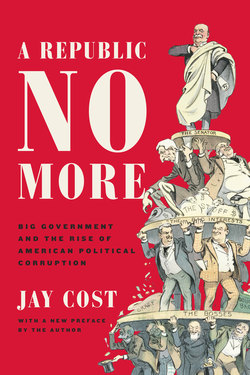A Republic No More

Реклама. ООО «ЛитРес», ИНН: 7719571260.
Оглавление
Jay Cost. A Republic No More
Отрывок из книги
“In explaining ‘corruption as a permanent, institutionalized feature of our government,’ Jay Cost has made a major contribution to American history and political science. His narrative is detailed and lively, accessible to citizens and scholars alike. And he makes a case for reform while suggesting its limits. A real tour de force.”
—WILLIAM KRISTOL, editor of The Weekly Standard
.....
To be clear, the problem is not with expansive governmental powers per se. Rather, it has to do with the institutions of government that exercise those powers. Specifically, we use eighteenth century institutions, originally meant to do much less, to exercise virtually limitless power in the twenty-first century. We could, in theory, redesign the government to make it handle these powers responsibly; we could rebuild the system from the bottom-up following the general principles set forth by Madison. But of course, we have never done that. We have never even really thought seriously about that prospect. Instead, we have chosen to have our cake and eat it too—a government of vast nationalistic powers with parochial institutions. The cost of our ambivalence is corruption.
There are three major nationalistic powers the government has acquired that the Constitution, as produced in Philadelphia in 1787, never really anticipated. The first is the power to forge a national economic marketplace, the battle over which produced the first great political upheaval in the 1790s. As we shall see in Chapter One, the cornerstone of Hamilton’s program was a nationally chartered bank, which the Constitutional Convention in Philadelphia had explicitly rejected as a federal power. Yet this was deemed an implied power through the Necessary and Proper Clause of the Constitution, and thus began a precedent of interpreting the powers within the Constitution as broadly as politically possible. Since Hamilton’s day, both sides of the partisan divide have embraced the idea that the federal government should promote the national economy, and both sides seek to do it in ways that are not really reconcilable with the Constitution as understood at ratification. This is a power that expanded slowly throughout the ages. In the nineteenth century, it began with the Bank, then proceeded to internal improvements, then tariff protections for business, then direct subsidies for the railroads. Today, there is a vast system of federal supports for businesses, from the tax code to corporate welfare to selective tariff preferences. Putting aside whether these items were constitutional in a legal sense, the fact remains that the Framers envisioned very little of this regime.
.....